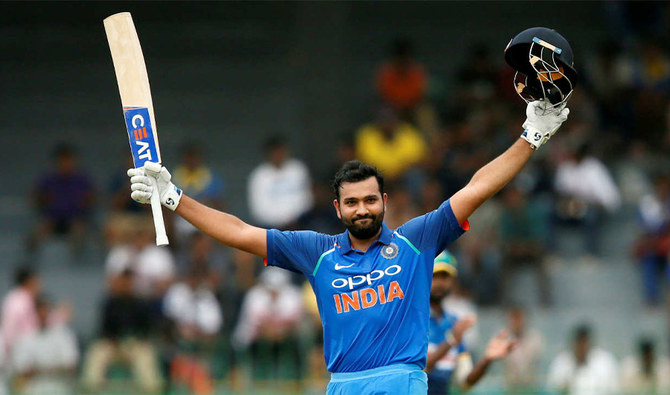KARACHI: The ICC World Cup 2019 has reached its midway point, with the race for the semifinals still wide open. But enough time has passed to get an idea of the teams that have been setting the tournament alight, and the players to watch out for. These are the Arab News picks for the top three batters and bowlers at the World Cup so far.
Shakib Al Hasan, Bangladesh Cricket’s first proper superstar
Quite a few people, not just in England and Australia but also Pakistan and India, will be upset by the suggestion that halfway through the series, the best player in this World Cup is from Bangladesh. But the stats say it all. No one has as yet scored more runs than Shakib’s 384, no one has hit more hundreds, and none of the other players mentioned on this list have his all-round ability, considering that he has picked up five wickets also. But Bangladesh cricket’s first proper superstar has sometimes deceived in the past. In three previous World Cups, his batting and bowling numbers were worse than his career stats, and he was more important as a bowler. Pushing for and receiving a move up the order this time around, he’s been impeccable with the bat, and his confidence has oozed down to his teammates. Twenty years after a shock win in a World Cup in England kick-started Bangladesh’s cricket journey, they now arrive with a dark horse team and one of the world’s best players. It’s been quite a journey. As Gaurav Kalra, Sports Group Editor at Network 18, tweeted, Shakib should take over as boss of the universe:
Shakib should take over as Universe Boss #WIvBAN #CWC19
— Gaurav Kalra (@gauravkalra75) June 17, 2019
Rohit Sharma, India’s insouciant genius
Every generation seems to produce a creative genius whose greatest works stand the test of time, though a lack of motivation or interest causes them to burn out rather than fade away. It might not be exactly fair to label Rohit Sharma as such, but it is confusing why one of cricket’s most transcendent talents hasn’t reached the heights that other greats of his era have touched. In contrast to his great contemporary Virat Kohli, Rohit gives off the perception of not quite wanting the acclaims as much. Still, in white ball cricket, Rohit is a certified legend, and in this tournament he has been the highest averaging batter, showing off a shocking range of shots in his trademark insouciant style. Pakistan were lucky not to receive yet another Rohit double hundred. In the history of the game, that has only been achieved eight times by five players who’ve done it once, and Rohit, the sixth, has done it thrice. Don’t bet against him adding to that total sometime this tournament.
In my opinion, Rohit Sharma one of the best openers in the history of ODI #cricket.
His ability to shift gears and destroy bowling attacks after getting his eye in is second to none.
— Madhav Sharma (@HashTagCricket) January 12, 2019
Joe Root, lead vocalist-turned-bass guitarist of English cricket
Joe Root is easily the most classical and all-round batter on this list, and in an England side packed with maddeningly explosive hitters, it might be a surprise to see him on this list. But Root, for so long the lead vocalist of English cricket, has shifted to bass guitar and it’s worked out brilliantly. He sets the tone for everyone else by playing as the anchor around which the already fearless hitters can play with even more freedom. His two hundreds have come at a fast pace and yet never once carried the bludgeoning that marks his teammates’ efforts, defined instead by shots meant to keep the traditionalists happy. Root’s solidity is also England’s main failsafe option if the weather creates unfriendly batting conditions. For all of England’s celebrated offensive firepower, they would need Root humming along the way he has been in order to win the tournament they are favourites for.
ROOOOOOOOOOOOOOOT!
Watch the highlights from Joe Root's second century of #CWC19 pic.twitter.com/1cxtG87uFF
— ICC (@ICC) June 14, 2019
Mohammad Amir, Pakistan’s only world class player
Pakistan cricket has a maddening quality of only being able to be described in cliches. For example, as the sporting world embraces data analytics and increasingly makes decisions based on computing insights, Pakistan makes a mockery of stats. Coming into this tournament, Mohammad Amir had taken five wickets across two years since a star appearance at the Champions Trophy final. His average was in the 90s, his strike-rate in three figures. Pakistan bet on his potential and talent when selecting him, and once the tournament began Dr. Mohammad went away and Mr. Amir arrived at the party. Thrice now as Pakistan have conceded 300 against three of the best sides - Australia, England and India - he has conceded under five an over, and in each has looked the only world class player in green. His tournament best, 5-30 against Australia, was good, but he was superb in the crushing loss to India as he provided the only fight India faced in that match. It is no wonder so many have compared him to Wasim Akram, one of the greatest bowlers of all time:
Setting New Record: Mohammad Amir becomes the Ist Pakistani bowler who delivered best spell ever by grabbing 5wkt with 30 runs against any test playing team in WC history today. Exactly 16yrs ago, it’s Wasim Akram who took 5-28 against Namibia in 2003. #AusvPak #AmirWeldon
— Zahid Gishkori (@ZahidGishkori) June 12, 2019
Mitchell Starc, Australia’s booming inswinger
Tied with Amir for having taken the most wickets, Mitchell Starc has continued his form from the last tournament where he ended up as the top wicket taker. For a year, while former captain Steve Smith and star batter David Warner served a ban for ball tampering, Starc’s numbers had fallen off a cliff. Now, with those two back in the side, it appears Starc has magically rediscovered his mojo. The booming inswinger is back, but it helps that he has always been one of the best proponents of the yorker. In a tournament where too many bowlers have been guilty of bowling too short, his ability to find the feet has helped a scratchy, inconsistent Australian side pick up slightly undeserved wins against Afghanistan, West Indies, Pakistan and Sri Lanka. Each of those wins involved Starc leading or participating in causing a collapse, and his presence has allowed Australia to boast a record much better than their collective efforts have suggested.
38 were required of 5 overs with 4 wickets in hand and Holder at the crease for West Indies. But Australia conceded only 6 in the next 4 overs and picked up 3. Such was the brilliance of Mitchell Starc, the first 5-fer of this WC #AUSvWI
— Mohammad Kaif (@MohammadKaif) June 6, 2019
Jofra Archer, the x-factor in Team England
If there was a way to convert swag into statistics, Joffra Archer would have been the only player on this entire list. Young, effortlessly cool and exhilaratingly talented, the bowler has been the x-factor in England’s already formidable line-up. While the hosts have been able to rely on their batting to score just about anything, their uneven bowling has allowed even the likes of Pakistan to pile huge totals against them. Archer isn’t quite at the level where he can undo that profligacy by England, but with twelve wickets at an average better than Starc’s, he’s certainly making a big difference. And while he has made plenty of people take notice already, the feeling persists that we are yet to see the moment when Joffra Archer truly announces his arrival on the world stage. With England still to face arch-rivals Australia and co-favourites India, expect Archer to make a mark on one of these matches.
HE’S IN!!!!! Our pace machine is heading to the @icc #CWC19!
Congratulations, @JofraArcher!! #HallaBol pic.twitter.com/felilPK9y8
— Rajasthan Royals (@rajasthanroyals) May 21, 2019





















